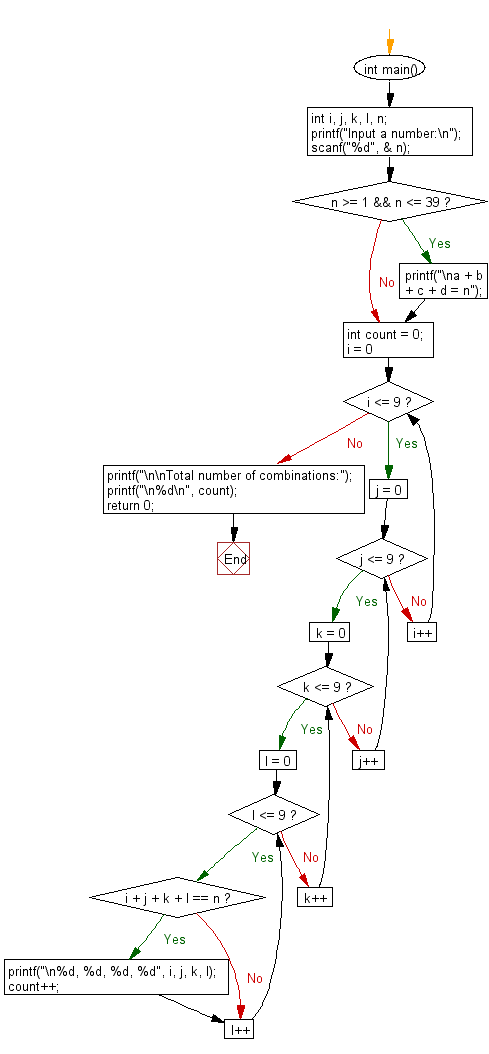C Exercises: Number of combinations of a, b, c and d (0 <= a, b, c, d <= 9) where (a + b + c + d) will be equal to n
C Basic Declarations and Expressions: Exercise-135 with Solution
Write a C program which reads an integer n and find the number of combinations of a, b, c and d (0 <= a, b, c, d <= 9) where (a + b + c + d) will be equal to n.
Input:
n (1 <= n <= 50)
Sample Solution:
C Code:
#include <stdio.h>
int main() {
int i, j, k, l, n;
printf("Input a number:\n");
scanf("%d", & n);
if (n >= 1 && n <= 39)
printf("\na + b + c + d = n"); {
int count = 0;
for (i = 0; i <= 9; i++) {
for (j = 0; j <= 9; j++) {
for (k = 0; k <= 9; k++) {
for (l = 0; l <= 9; l++)
{
if (i + j + k + l == n) {
printf("\n%d, %d, %d, %d", i, j, k, l);
count++;
}
}
}
}
}
printf("\n\nTotal number of combinations:");
printf("\n%d\n", count);
}
return 0;
}
Sample Output:
Input a number: 5 a + b + c + d = n 0, 0, 0, 5 0, 0, 1, 4 0, 0, 2, 3 0, 0, 3, 2 0, 0, 4, 1 0, 0, 5, 0 0, 1, 0, 4 0, 1, 1, 3 0, 1, 2, 2 0, 1, 3, 1 0, 1, 4, 0 0, 2, 0, 3 0, 2, 1, 2 0, 2, 2, 1 0, 2, 3, 0 0, 3, 0, 2 0, 3, 1, 1 0, 3, 2, 0 0, 4, 0, 1 0, 4, 1, 0 0, 5, 0, 0 1, 0, 0, 4 1, 0, 1, 3 1, 0, 2, 2 1, 0, 3, 1 1, 0, 4, 0 1, 1, 0, 3 1, 1, 1, 2 1, 1, 2, 1 1, 1, 3, 0 1, 2, 0, 2 1, 2, 1, 1 1, 2, 2, 0 1, 3, 0, 1 1, 3, 1, 0 1, 4, 0, 0 2, 0, 0, 3 2, 0, 1, 2 2, 0, 2, 1 2, 0, 3, 0 2, 1, 0, 2 2, 1, 1, 1 2, 1, 2, 0 2, 2, 0, 1 2, 2, 1, 0 2, 3, 0, 0 3, 0, 0, 2 3, 0, 1, 1 3, 0, 2, 0 3, 1, 0, 1 3, 1, 1, 0 3, 2, 0, 0 4, 0, 0, 1 4, 0, 1, 0 4, 1, 0, 0 5, 0, 0, 0 Total number of combinations: 56
Flowchart:

C programming Code Editor:
Contribute your code and comments through Disqus.
Previous: Write a C program to check whether three given lengths (integers) of three sides of a triangle form a right triangle or not. Print "Yes" if the given sides form a right triangle otherwise print "No".
Next: Write a C program to find the prime numbers which are less than or equal to a given integer.
What is the difficulty level of this exercise?
Test your Programming skills with w3resource's quiz.
C Programming: Tips of the Day
Static variable inside of a function in C
The scope of variable is where the variable name can be seen. Here, x is visible only inside function foo().
The lifetime of a variable is the period over which it exists. If x were defined without the keyword static, the lifetime would be from the entry into foo() to the return from foo(); so it would be re-initialized to 5 on every call.
The keyword static acts to extend the lifetime of a variable to the lifetime of the programme; e.g. initialization occurs once and once only and then the variable retains its value - whatever it has come to be - over all future calls to foo().
Ref : https://bit.ly/3fOq7XP
- New Content published on w3resource:
- HTML-CSS Practical: Exercises, Practice, Solution
- Java Regular Expression: Exercises, Practice, Solution
- Scala Programming Exercises, Practice, Solution
- Python Itertools exercises
- Python Numpy exercises
- Python GeoPy Package exercises
- Python Pandas exercises
- Python nltk exercises
- Python BeautifulSoup exercises
- Form Template
- Composer - PHP Package Manager
- PHPUnit - PHP Testing
- Laravel - PHP Framework
- Angular - JavaScript Framework
- Vue - JavaScript Framework
- Jest - JavaScript Testing Framework
